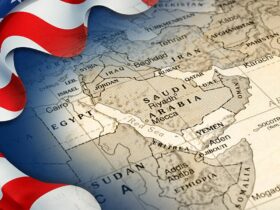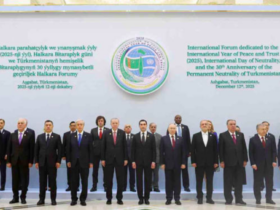From April 23 to May 23, the Islamic world celebrate the annual Ramadan fast. However, for the first time this year, Muslims in most countries of the world will have to observe under special circumstances. The coronavirus pandemic is the primary culprit: Muslims from Indonesia to Morocco have not gathered for prayers for weeks. But what about Ramadan?
Ramadan, the ninth month of the year according to the Islamic calendar, is a period dedicated to fasting, prayer and the observance of specific rituals in light of the first revelation of the Quran by the Archangel Gabriel to the Prophet Muhammad. Annual observance is regarded as one of the five pillars of Islam and obliges Muslims to refrain from sinful behavior. According to Islamic Sacred Scripture, the spiritual rewards of fasting multiply during Ramadan, and previous sins will be forgiven. For practicing Muslims around the world, the Holy Month is honored with peace, sharing, union and deep introspection.
Traditionally, in Islamic countries, neighbors and relatives gather together for iftar – the evening meal in which Muslims break their fast. There are also questions about traditional gatherings in mosques.

Needpix
Changes everywhere
In Turkey, which is now the leader in the number of people affected by coronavirus in the Middle East on the eve of Ramadan, the Directorate of Religious Affairs announced that “Iftar [fast-breaking] gatherings should be avoided with relatives, neighbors, and friends”. 25,000 people from 59 countries returned to Turkey to spend Ramadan with their families.
However, the pandemic may force the Turkish authorities to adopt new additional restrictions that will coincide with the beginning of Ramadan. From a political point of view, such restrictions may be negatively perceived by the electoral base of the ruling AKP party. Whether or not anti-epidemic requirements will trump the ruling party’s desire to please religious voters will soon be evident.
In Jordan, the government has announced that a special fatwa will be issued to explain what is to be done under the conditions of the pandemic. The Jordan appointed Jerusalem Islamic Waqf declared that Al-Aqsa mosque in Jerusalem would be closed during Ramadan.
In Saudi Arabia, all Muslim assemblies are banned: only home prayers are allowed. The Muslim Holy Cities of Mecca and Medina are closed. The Hajj is also canceled. Similar measures have been introduced in other Gulf countries. Only the UAE has taken a relatively relaxed approach. Grocery stores that had been closed were opened to allow fasting people to buy food.
Egypt also banned all public religious gatherings during Ramadan.
In some countries, such as the UK, communal Iftar will be live streamed on Zoom. Syria will lessen its curfew by 90 minutes a day and reopen some shops during Ramadan. Mosques will remain closed to communal prayers until at least May 2. In Libya, the Government of National Accord, on the other hand, is imposing a strict lockdown throughout the holiday. How this will work in a besieged city where militant groups are fighting for power is not yet clear.
So far, the exception to the rule is Pakistan. In this Muslim country, under pressure from religious leaders, authorities have allowed Muslim meetings in mosques during Ramadan. At the same time, believers must observe the rules of social distance, and it will be impossible to crowd in the mosques. Pakistan has thus shown itself to be the most traditionalist Muslim country. The dynamics of the coronavirus during the Muslim holy month will show whether or not this decision was justified.
At the same time, to keep the population at home, Pakistani television will start broadcasting the Turkish series “Resurrection: Ertugrul” during Ramadan by order of Prime Minister Imran Khan.
The acclaimed Turkish television series @DirilisDizisi is being aired on PTV on the instructions of Prime Minister @ImranKhanPTI. Airing will commence from the 1st of Ramazan at 9:10 pm on @PTVHomeOfficial with repeat at 12 midnight & 12 noon the next day. #ErtugrulUrduPTV pic.twitter.com/hjL32xCxCJ
— PTV World (@WorldPTV) April 20, 2020
To fast or not to fast?
Scientists at Cairo’s Al-Azhar University claim that Muslims must fast during Ramadan despite the coronavirus. At the same time, secular scholars argue that a Muslim fasting during a pandemic can be dangerous to health. As Muslims are not allowed to eat or drink during the day, fasting drains their throats and makes them more susceptible to infections. However, fasting during Ramadan is one of the five pillars of the Muslim faith.
In Algeria, local politician Noureddine Boukrouh (the former head of the Algerian Renewal Party (PRA) called to stop fasting during Ramadan because it “poses a health risk and contributes to the outbreak of the coronavirus”.
Shia clerics are reviewing whether it’s possible to fast during the pandemic for Shiite scientists. Ali Sistani, the senior most Shi’a Muslim cleric in Iraq, issued a rule that removed the restrictions imposed during fasting for Muslims who could not observe social distance, such as those who will have to work during Ramadan. Since their chances of getting the coronavirus are higher than those who sit at home, they are allowed to drink water during the day.
Iran’s Supreme Leader Ayatollah Ali Khamenei declared that mass gatherings and public events will not be allowed during Ramadan.
An excuse for jihad
Traditionally, jihadists of all kinds have used Ramadan as an excuse to increase terrorist activity, because jihadists consider the holy month as a month of conquest.
https://uwidata.com/9721-coronavirus-stimulus-for-global-jihad/
The Prophet Muhammad achieved the first Muslim victory in history in what is known as the Battle of Badr during Ramadan in 624. During Ramadan in 630, Muhammad conquered Mecca. Jihadists exploit these historical references by manipulating them for political ends. Followers of the Islamic State believe they are observing Islam in its most effective form by attacking kafirs (to whom they add even other Muslims who do not belong to their sect).
This year does not seem to be an exception to the rule. In Tunisia, for example, local security forces arrested an ISIS sympathizer who was planning attacks on State institutions during Ramadan.
But neither ISIS, nor Al-Qaeda have issued proper guidelines for Ramadan; ever. However, jihadists have previously stated their willingness to intensify attacks during the coronavirus pandemic. Thus, residents of different countries should prepare for new attacks by jihadists. The most active terrorists in recent times have been in Africa. However, in other parts of the world, it is also worth preparing for possible extremist attacks, especially in places where large numbers of believers will gather in mosques such as in Pakistan.

















Leave a Reply